#Ã is a nasal vowel and french also has that nasal vowel (and many more) and is written “an” or “en”
Text
France: Did you know that Scots is a language because they decided it so. A bit like Portuguese is a language instead of Spanish.
Portugal: Excuse YOU! Portuguese is completely different than spanish.
Spain: a little bit. but I think France got a point.
Portugal: *grabs Spain by the collar* Say ã, Antonio.
Spain: 😰
Portugal: SAY IT. SAY Ã
France: *laying seductively* an
Portugal: *throws Spain at France* Shut the fuck up. I hate both of you.
#aph france#aph portugal#aph spain#hws france#hws spain#hws portugal#source: original post#Ã is a nasal vowel and french also has that nasal vowel (and many more) and is written “an” or “en”
73 notes
·
View notes
Text
phonological history (of vowels). finally!
yeah so this is the stuff i spent most of my time on for this conlang
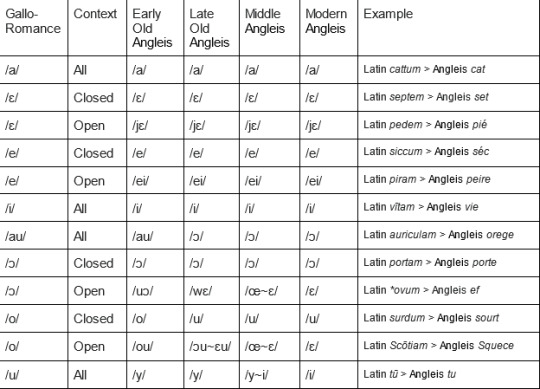
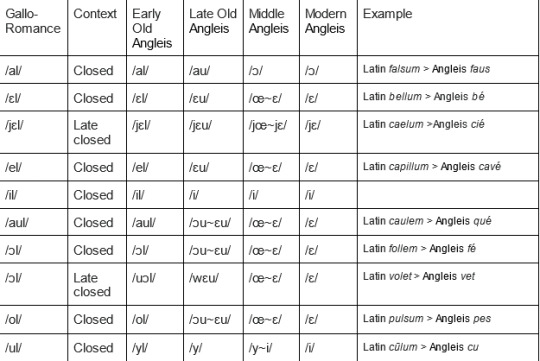
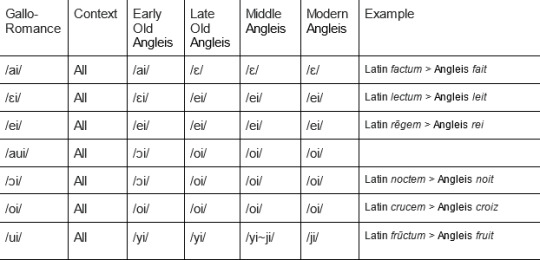
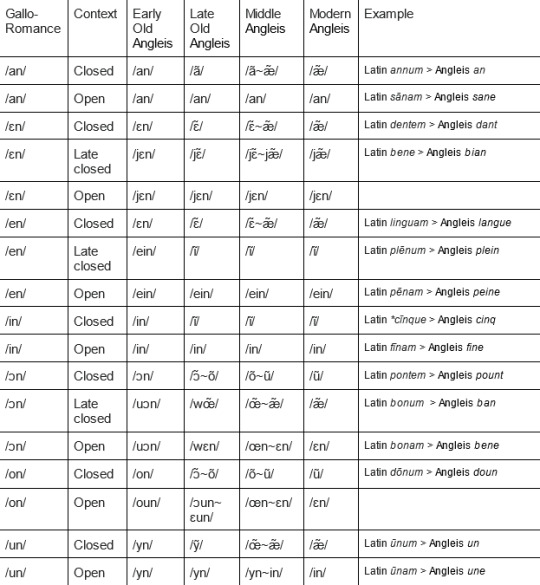
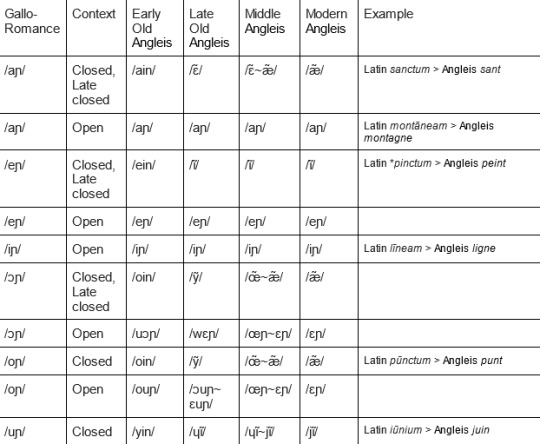
CHART DUMP!! i know. its a lot of info but i find all of it very useful for my conlanging when it comes to vowels
some term clarification i guess: a closed syllable is one that has a coda, and an open one has no coda. a "late closed" syllable in this context refers to syllables that are open in latin but become closed in proto-gallo-romance; examples include latin caelum /'kae.lʊm/ > gallo-romance /tsɛl/ and latin bene /'bɛ.nɛ/ > gallo-romance /bɛn/
i guess i'll mention some of my favorite outcomes!
i'm particularly happy with the development of the vowel represented by <u>, which has merged with the vowel of <i>. this occurred because latin /i:/ continued to modern angleis with the value of /i/, and latin /u:/ became gallo-romance /u/, old angleis /y/ (following in the pattern of most gallo-romance languages, obviously most notably french), but then unrounding to /i/, making une be pronounced /in/
i also particularly like the many nasal vowel mergers to /æ̃/; from old angleis /ɛ̃/, /ã/, and, more distantly, /ỹ/. the /ɛ̃/ and /ã/ are pretty simple, they just converged on /æ̃/, but old angleis /ỹ/ developed to middle angleis /œ̃/, which would have already begun to unround to /ɛ̃~æ̃/ in late middle angleis in the 16th-ish century
lastly, multiple vowels simply just end up at /ɛ/, those being latin /ɛ/ in closed syllables (unsurprisingly), latin /ɔ/ in open syllables (strangely), and also latin /o/ in open syllables (also strangely). the reasoning for /ɔ/ is it diphthongizes by old angleis, becoming /uɔ/, and then /wɛ/, which by middle english becomes /œ/, and finally it unrounds to /ɛ/. for the /o/, it diphthongizes to /ou/ in old angleis, and in later old angleis that fronts to /ɛu/, which then becomes /œ/ (again) in middle angleis and then obviously unroungs to /ɛ/. thats a lot of /ɛ/
anyways see yall tomorrow i think im gonna do some personal PRONOUNS tomorrow
#conlang#constructed language#linguistics#historical linguistics#french#latin language#vowels#phonology#phonetics#also im trans
0 notes
Link
French and Italian grammar are drastically different (and closer to original Roman Latin) of Portuguese and Spanish (which are also distinct among themselves). It influences phonetics a lot, since French and Italian have a lot of abbreviations that don't appear (only rarely in case of Portuguese) in Iberian languages, and may confuse unaware ears.
French phonetics is different of most of other Latin languages (conserving even some phonemas of late Roman Latin, like the pronounces of "oe", "ai", "au"). The sound of "r" is also distinct (more aspirated). In general, French is the most "nasal" of the Latin languages. "Au" will sound like a strong "o", "ai" like "a" in "fast" (American English) and "oe" like "ö" in German.
Italian phonetics is very influenced by Greek. And unlike the other languages mentioned in the question, plurals are not denoted with "s", but with "i" (male), "e" (female), "a" (neutral). The Latin language with the closest phonetics to Italian's is Romanian/Moldovan. The rolled sound of "r" is also stronger than in the other languages (will sound like "rr" in Spanish). "R" in Portuguese has the same sound as in French, when it starts a word (always) and when it is double in the middle of words.
The sound of "j" in Spanish is like "h" in English, which is unique of this language. In Italian, like in Greek or German, "j" sounds like a soft "y". In Portuguese and French, though, "j" has a sound that Spaniards and Italians have usually a hard time trying to pronounce (which may have come from the Celtic languages spoken in the territories that comprise France and Portugal/Galicia prior to Roman conquest), and sounds much like "Җ" (zh) in Russian.
Nh in Portuguese = Ñ in Spanish = Gn in French/Italian. In Spanish "ñ" 's pronounciation is less emphasized.
Lh in Portuguese = Ll in Spanish = Gli in French/Italian. In most of Hispanic America (except Argentina, Uruguay and Paraguay), you will find most of people pronoucing "ll" just like "j" in American English. In Argentina and Uruguay, "ll" will sound like a French "j", due to the strong influence of Southern Italian dialects brought by late 19th/early 20th century's immigrants. In Paraguay, "ll" will be mostly pronounced like in Spain.
In Spanish there is no "v", "z" or "sh" sounds like in English. "V" in Spanish is called "ube" and will mostly sound like a very soft "b", z ("zeta") in Spanish is almost a nasal "s". "S" in the middle of words, in Portuguese, Italian and French, follows the same rules as in English.
The sound of "sh" in English, is made by "ch", and at times "x" (xadrez, xilofone, xenofobia, caixa, relaxado, eixo, mexicano) in Portuguese/French, by "sci" in Italian, and is absent in Spanish. In European Portuguese "sc" will also sound like "sh", at times, but it is also subject to regional accents and dialects of the language. "Ch" in Spanish will sound virtually the same as it sounds in English, and in Italian, it has a phonetic of "k".
The sound of "x": In Portuguese, x will often sound like sh in English (when it starts a word, always), but it may also sound like "ks" in the middle of words (reflexão, circunflexo, axíoma, oxigênio). The sound of "ks" for "x" is a standard to Latin languages (inherited of Greek), but in Spanish it, just like "j", can also have the same pronounce of "h" in English.
"Ç" in Portuguese and French will have the same sound of "z" in Spanish and "ss" in Italian (which is also the same in English). "Ss" is also used in Portuguese and French. In all these languages, "Ss" is never used to start a word (no word in Portuguese will ever start with a “ç” either).
Portuguese has the biggest rank of accents among Latin languages: Á (a stressed and open sound of A), Ã (a nasal sound of A that will be rarely found in any other language. Usually the hardest for foreign Portuguese students), Â (similar to Ã, but softer), À (simbolyzes a double A, and is used exclusively as the feminine of "ao"), É (like "eh", sounds like "e" in the word "best", in American English), Ê (a nasal and stressed form of "e", used to emphasize this vowel in a sylabe), Í (stressed for of "i", sounds like "ee" in English), Ó (open stressed form of "o", sounds like "o" in the American pronounce of "blossom", or "loss", or “å” in Swedish), Ô (nasal sound of "o", sounds like "au" in French), Õ (very nasal form of "o", almost an "u". Usually comes within "es" as a plural form of many words ended in "ão", like "feijão/feijões" [bean/beans], padrão/padrões [standard/standards], mansão/mansões [manor/manors]), Ú (a stressed form of "u", sounding like "oo" in English), Ü (not officialy used since the International Ortographic Agreements of 2009, between Brazil and Portugal. Served for highlighting the sound of "u" in situations in which it would be normally a deaf/auxiliary vowel [basically, when accompanied of q or g before e or i], like "lingüiça, "agüenta" and "aqüífero").
It is almost possible to trace a "sequence of similarities" between Latin languages. If you know one or two of them which are not way too similar (like Portuguese and French, Spanish and Italian, French and Spanish, Italian and Portuguese), you will be able to "deduce" the meaning of many words of the others (at least in written form). Based on the informations above, there are some examples for training your pronounciation (native speakers, please, suggest me any corrections by editing):
English: “I have been writting on Quora for seven months. During all this time, it helped me to acquire much knowledge and also to make clear many of my doubts and curiosities”.
Portuguese: “Tenho escrito no Quora há sete meses. Durante esse tempo, isso ajudou-me a adquirir muitos conhecimentos e a clarificar muitas das minhas dúvidas e curiosidades”.
Galician: “Teño escrito no Quoara hai sete meses. Durante este tempo, iso axudoume a añadir moitos coñecementos e a clarificar moitas das miñas dúbidas e curiosidades”.
Spanish: “Hace siete meses que estuve escribiendo en Quora. Durante todo ese tiempo, me ha ayudado adquirir mucha sabiduria y tambien clarificar muchas de mis dudas y curiosidades”.
Catalan: “He escrit sobre Quoran fa sete mesos. Durant aquest temps, això em va ajudar a guanyar un munt de coneixements i per a aclarir molts des meus dubtes i curiositats”.
French: “J'ai écrit dans le Quora il ya déja sept mois. Pendant ce temps, il m'a aidé à gagner beaucoup de conaissance, et clairifier beaucoup des mes doutes et curiosités”.
Italian: “Scrivo su Quora sin da sette mesi fa. Durante tutto questo tempo la cosa mi ha aiutato ad acquisire molte conoscenze, ha chiarito molti dei miei dubbi e ha soddisfatto molte mie curiosità [the verb ”chiarire” does not apply to “curiosità“] ”.
Romanian: “Am scris pe Quora de șapte luni. In acest timp, ea ma ajutat să câștige o mulțime de cunoștințe și de a clarifica mai multe îndoieli și curiozități mele”.
1 note
·
View note